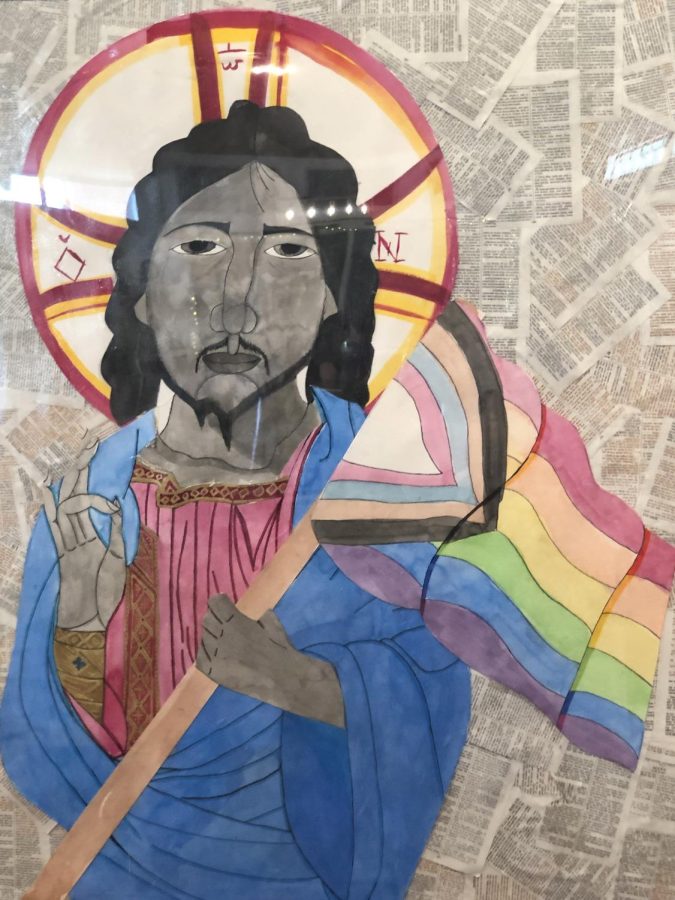Loyola United Methodists remain united despite church schisms
A painted depiction of Jesus Christ holds a progressive flag inside a Methodist church. The ordination of gay clergy members and marriages has split Methodist churches nationwide.
March 26, 2023
NOLA Wesley House is one United Methodist Church that has been a refuge for some of Loyola’s queer methodists.
“The Wesley House is almost like a safe haven for us, because there are a lot of churches who aren’t as affirming,” said Kaley Delker, sophomore history major and parishioner.
United Methodist Churches have been undergoing a schism over the choice of some churches to ordain queer marriages and clergy, despite official UMC policy not recognizing them as legitimate. This has led some conservative UMC churches to break from the national body in an ongoing process of disaffiliation, according to Rev. Zoë Garry, pastor at the Loyola and Tulane UMC campus ministry called NOLA Wesley.
Last year alone, 58 Louisiana churches left the UMC, including the largest former UMC church in the state, the Associated Press reported. As of January this year, over 2,000 churches, 6.6% of all UMC churches, have divorced themselves from the UMC. This process requires two-thirds of the congregation to vote to leave and continue pension and liability payments for two years, The Week reported. Not having a supportive home church network can be challenging for queer students, Garry said.
“We have several students who did grow up in the Methodist church and it is a conversation, and, especially for our students who are in queer bodies, those conversations at home are really painful,” Garry said. “This is a place where they can talk about their anger or mistrust or rejection.”
Garry described NOLA Wesley as a proud “progressive Protestant voice for the Tulane and Loyola Community” and a “queer-affirming Methodist and Presbyterian ministry.” Despite larger schisms, Garry said the student body at Loyola has remained united behind the queer-inclusive identity espoused by NOLA Wesley.
“We are definitely affected by the schism, because those are the churches that support us and love us and pray for us, but we ourselves have our own unique identity,” she said.
Delker seconded the notion that the Methodist community at Loyola remains united under a progressive and queer-inclusive vision of the church. However, Delker also stressed the challenges students face in finding acceptance outside of campus.
“I have been to other Methodist churches in the area to see if I was more comfortable there than at the Wesley House and I wasn’t,” she said.
Away from campus, sectarian disputes have impacted students, Delker and Garry said.
“There were conservative rioters throwing things at delegates who had pronoun pins on or people who were supportive of the [queer] community,” Delker said, recalling a violent protest she saw at a Florida UMC conference. “With the rising amount of anti-LGBTQ legislation, there is definitely a fear that the UMC will turn more conservative.”
Next year, the UMC will host its 2024 general conference, which will determine how the church will view queer marriage and clergy going forward, Garry said. While she predicted the conference would prove contentious, Garry said she remains hopeful that the UMC would move to recognize queer marriages and clergy.
“I am always and ever hopeful that the voices and the votes of the congregation will be rooted in affirmation and love, and I believe that is what is at stake,” she said.







